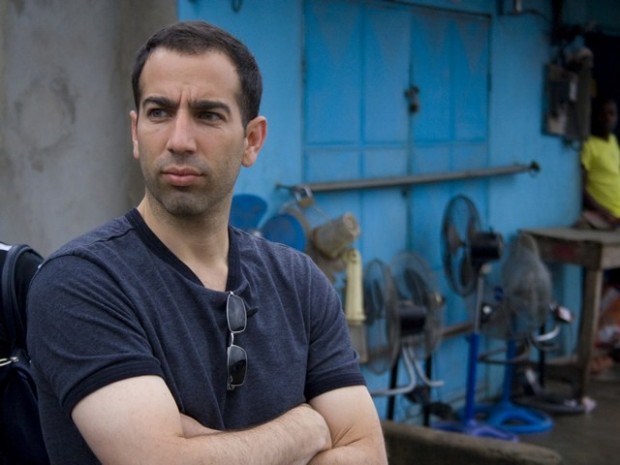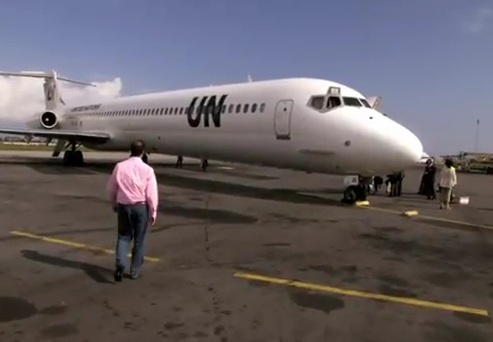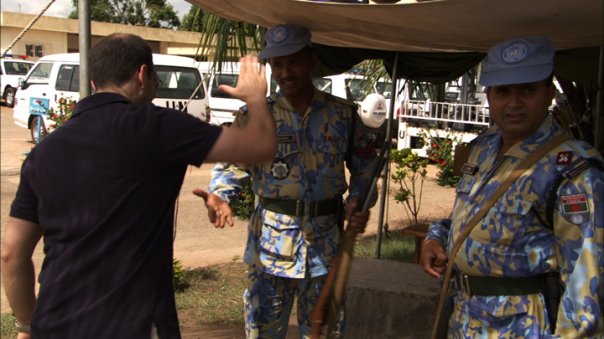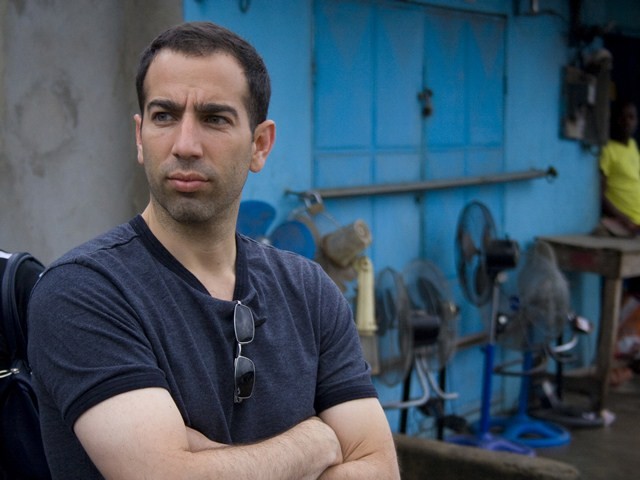
One of the more intriguing documentaries to hit theaters this year is U.N. Me, Ami Horowitz‘s critique of the United Nations for their failures in protecting international human rights. The film follows Horowitz’s journey around the world as he interweaves interviews with politicians, peacekeepers and civilians and archival footage to show UN abuses of power, such as peacekeepers shooting on unarmed civilians and partying with brothel women instead of patrolling the frontlines of a brewing civil conflict. I was fortunate enough to sit down and interview Horowitz to discuss how he became interested in the project, the message he wishes viewers to take from the film and whether or not he believes there’s any hope for the United Nations.
The Film Stage: I read that you were an investment banker before you became a filmmaker. What lead you to take such a dramatic turn and to make a film, especially about the U.N.?
Temporary insanity, although now it seems to be permanent insanity. I still keep thinking “Why are you doing this stuff?” But, it was actually sort of an epiphany, believe it or not, I actually had an epiphany. I wasn’t sure if those things existed but I had one so I can attest to the fact that they do happen. It’s funny, it was a Saturday night and I was watching Bowling for Columbine and I had seen it before, so I was just kind of drifting off. I started thinking about, and I can’t tell you why, but I started thinking about the United Nations, just out of the blue. And I was thinking about Rwanda, Sudan, all this terrible stuff over the world and whose job is it to stop this stuff? And it became obvious to me that it was the U.N.’s job. And, thinking about it, I was getting very upset.
It was two emotions; I was infuriated, about all this terrible stuff and the U.N. not stopping it, and I felt very insignificant, very small, which I really hate to feel, to be honest, I mean who does, right? And I looked over from the Michael Moore movie and I said to myself, “God, this guy he sure know how to make an entertaining and engaging movie. He’s really taken a documentary and turned it on its head, and it’s a really effective vehicle to get your point across.” I didn’t have any interest in filmmaking. Before, I had never even thought about making a movie, but I thought, “This is a medium I wanna pursue to get my point across.” And that was it. I decided to quit my job to make a movie. Having said that, I have since fallen in love with the medium and all I wanna do is make movies. But yeah, that was it. That was the moment.
How long did it take you to make the film? I’m so amazed that you were able to get into the security council, how were you able to get that kind of access?
It was very interesting. Basically all the access came from Ken Turner. And I basically pitched to him and his organization that I wanted to make a movie. Most people don’t know that Ken Turner is actually one of the most powerful people in the U.N. He gave them a billion dollars so he has a lot of power and access. And I said I wanted to make a movie to show the world what the U.N. was all about, basically a pro-U.N. movie, and they opened the doors for me.

It’s not quite a pro U.N. movie, it has a lot of criticism. Do you think the U.N. is a lost cause or do you think it is gonna learn from its mistakes?
I never like to say the words “lost cause” that implies that we should give up. I don’t think we should give up but I think at a certain point we have to reassess whether it does work. And the answer to that question is, well it’s not as easy as it sounds. I think there are ways to reform it.
What message do you want viewers to take away from this? Is there something that you’d like to see people doing as a response to this?
Well first and foremost, I want people to be entertained. Even though this is a message that I’m trying to get across, I knew that I’d chosen an entertaining medium, so, I think a lot of mistakes that documentaries make is making a documentary and not really focusing on entertainment. I think that’s why a lot of documentaries get zero to no attraction in the box office. I knew I had to entertain first and then I had to get my point across, not the other way around. So, first of all, I want people to walk away thinking, “That was a really entertaining documentary, I wasn’t bored at all. It was really good, and funny.” And secondly, I want people to not feel the way I felt, which is small, and like they can’t do anything, because I don’t like that feeling and I’m sure nobody else does. So I want people to walk away with the notion that, you know what, there are things that we can do.
The website, which will hopefully be up in the next day or two with all the bells and whistles, is sort of a call to action. A call to action may seem trite, but I’ll tell you why it’s not. I think that, all your congressmen, send your congressman an email on the website I set up, theunmovie.com. It’s all set up in a way to be a portal to get you to your congressmen. And the reason why it’s not something which is meaningless is that congress is the only body which controls the purse strings of America, and we fund 25% of the U.N.’s activities. Without that money, the U.N. wouldn’t exist. And if we tell our congressmen, by giving this money every year, without checks and balances, we’re enabling the U.N. to do what they did.
We’re enablers. It’s as simple as that. And unless we break that cycle, nothing’s ever gonna happen. So if it’s gonna change because of our money, saying we’re gonna start with holding funding unless we see reform. Unless you say that Iran has no place on the women’s rights council, nothing’s ever gonna change. Unless you tie it in directly to these kinds of claims, nothing will change. If you do, then we’ve got a shot. Tie it in and say listen, China and Cuba and Libya and Sudan have no place on the human rights council. If we do that, then I think we have a shot. So that’s what I want you to walk away with: entertainment, and we can actually get something done.
Instead of doing the whole traditional rant about violations and injustices, I like the fact that you’re trying to balance it with humor. Is it difficult to write comedy into a documentary style?
Yeah, it’s pretty hard. It’s probably one of the toughest things we have to do, which is to have this kind of balance between informative and humor. We brought in really good people to help us, writers of The Onion, Michael Moore’s writers and editors, and that was a big help. You’re sitting in the editing room trying to balance these two ideas and it’s tough. It was probably the toughest thing we did, but I think we were able to accomplish it. I mean you’re a better judge than I am, but I think we were able to pull it off. Again, from the beginning, I knew that was something we had to do.

You chose to focus mostly on peace keeping and human rights abuses in the film. Why did you chose those topics rather than the traditional U.N. moral gray spots like Israel?
Good question. It’s because, I have a very definitive opinion of what’s going on in Israel and I do believe, strongly, that there’s a tremendous amount of bias against Israel. But I chose not to do it because I didn’t want Israel to become the focus of discussion. I don’t wanna have to debate Israel. Because often times that happens when you start talking about Israel. I wanted I to mainly be about the U.N. So for better or for worse, I think for worse, Israel becomes a distraction. And I didn’t want that to happen in this film. I wanted to keep the focus on what the U.N. itself was doing wrong. So it was a very conscious decision not to do that. I focused on human rights, topics that everyone universally can agree on.
What has the response, if anything, been from U.S. government official, or the U.N.?
Crickets.
Really? Wow.
Yeah I know that the U.N. has a sort of task force that they put together to combat movies. You would think they would have a task force to in place to help address the issues the movies bring up, but that’s not the way they see the world. So I know this is an issue on their radar and I know they’re frightened because this is attacking them through pop culture, in a way that they are not comfortable with. I think they’re scared by it, but as of now they have been very silent.
There has been a bit about whether or not it’s a conservative message or if it’s a liberal message or if there is any. Is there any kind of political skew that you were trying to go for?
Zero. We never went in saying “left wing, right wing, not left wing, not right wing.” I’m right in the center, everybody else who worked on the movie is mostly center, the editor, my co-director and the writers, the photographers, actually. So no, there’s zero political message. We wanted to make sure there was nothing like that.
Besides Michael Moore, was there anyone or anything else that inspired your approach and your filmmaking style?
Yeah, I would say that Sacha Baron Cohen played an outside role in my influence, particularly when I did interviews. I play a character, maybe a slightly more elegant character than his, but nevertheless a character.

How do you think that your personal voice differs from these filmmakers?
I think Moore takes a more confrontational approach with his subjects and so a lot of people walk away from him. I had one guy walk away from me because I took a confrontational approach. It actually worked on screen but it wasn’t my intention. And my approach is to be more of that bumbling idiot, to draw more out of them. Say stupid things, it’ll draw more out of them. But Sacha Baron Cohen’s work, obviously he does things from a political point and his characters are far more obvious, and I made mine a little less so.
So what do you think you’re gonna do after this film? What would be your next topic to approach?
I don’t know but I do know what it won’t be. It will not be a U.N. Me Part II. That much I can promise you.
U.N. Me is now in limited release and on VOD.

